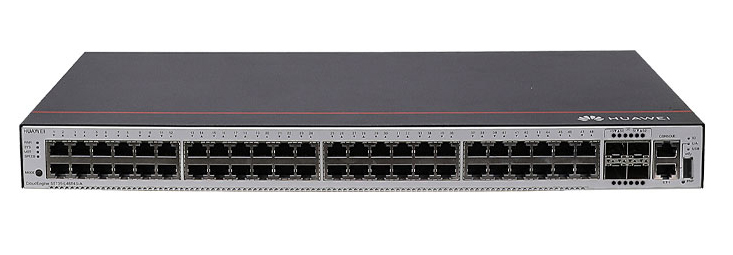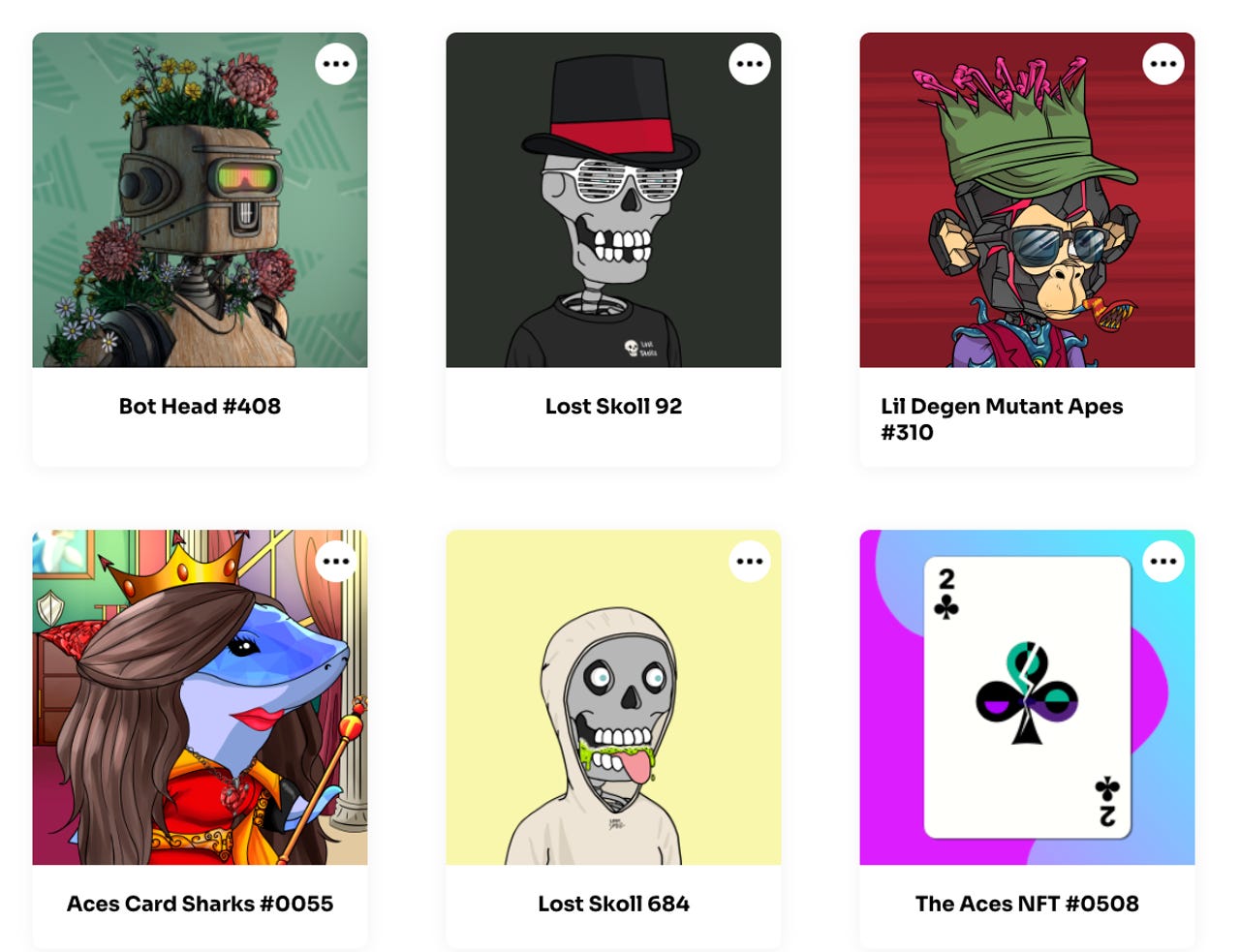































 Screenshot by Jason Cipriani/ZDNet
Screenshot by Jason Cipriani/ZDNet Over the last year I've had many conversations about NFTs and crypto with friends, family and strangers alike. I went from being skeptical about crypto, to mining or farming on my own, and, eventually, I started buying NFTs.
What started out as something I thought was just about the art has turned into what I'd call a hobby. I spend hours researching projects, being active in various communities and, surely, annoying my Twitter followers with tweets and retweets about NFTs.
Also:Check our ZDNet's Crypto Coach column
Below you'll find my own lessons learned over many, many hours. I've tried to explain what NFTs are, detail how you can get started, and offer some sage advice of my own.
NFT stands for "non-fungible token," which really just makes the whole idea of NFTs even more confusing. In more common language, an NFT is a one-of-a-kind digital asset -- they can be a video, a GIF, an audio clip or a standard image -- that is linked to a crypto coin's blockchain. The most popular NFT chain is Ethereum(ETH), but you can also find NFTs on Polygon (MATIC), Solana (SOL), Avalanche (AVAX) and Klaytn (KLAY).
Personally, I've spent most of my NFT journey looking at and buying NFTs on the Solana blockchain. I'll dive into more details about why below.
At least that's the most popular misconception about NFTs. In reality, the answer is: it depends. Some projects are simply about the art. There are several 1:1 artists that create a piece of art, sell it, and then collect a small royalty (usually under 10%) of future listings.
However, as I've learned over the last few months, the best NFT projects are run more like you'd run a company. In fact, I view buying an NFT as investing in the project, giving the founders the money they need to build the tools or deliver on the overall vision of the company.
You'll see a lot of vague but trendy terminology when researching different NFT projects. Terms like metaverse, Web3, and PFP. The latter of which simply means profile picture. As for the metaverse, that usually equates to some sort of virtual reality aspect to the project -- be it a character you can play in a game, or a world that you can visit. And Web3 refers to using the blockchain and decentralizing the internet as we know it using token-based economics.
You can certainly buy into an NFT project simply because you like the art. For example, I love the look of Trippy Frens and have several offers in on some right now. But, outside of providing access to a community of fellow holders (the term used for someone who holds an NFT) and a free mint from their next collection, there's really no other utility that I can see. At least right now.
I've been watching the CryptoMories project, fascinated by its approach. The project is centered on raising awareness for mental health, giving holders a community to talk to one another about their struggles. But, here's why I find CryptoMories most fascinating -- the team has partnered with Impact Suite, a company that provides mental health tools and access to counselors to provide holders and their families with free access to Impact Suite's tools and counselors. If you've ever paid for therapy you know how expensive it is, and right now you can buy a CryptoMorie for 0.174 ETH, or roughly$350. Free counseling for you and your family, for as long as you hold the NFT, for$350? Amazing.
Some projects create their own coin and offer rewards for "staking" your NFT -- which is essentially a promise that you won't sell or list your NFT for a period of time, and in exchange you'll earn the project's token. Depending on the project, you can exchange that token for cash (rare), or use it to enter raffles for giveaways of NFTs or other entry into other NFT projects.
Another way to look at NFT projects that are promising some sort of utility is to view them as a Kickstarter project. You invest money upfront, with the promise of a product materializing down the road.
Just like Kickstart projects, not every NFT project or team delivers on what they promise. When a project closes without refunding any money to holders, it's called a rug pull. A rugged project means that the developers flat-out scammed people into minting -- or buying -- an NFT and then walked away with the money. And when that happens, there's really nothing you can do except put it in the loss column and be more careful moving forward.
Where you buy an NFT depends on the blockchain you want to buy an NFT from. OpenSea is by far the largest NFT marketplace, supporting Ethereum, Solana, Polygon and Klaytn.
There are other marketplaces you can buy NFTs from, however. Magic Eden is the biggest Solana marketplace right now.
I don't have any experience researching or buying NFTs outside of Solana and ETH, with 95% of that experience residing within Solana for a few different reasons. The first is that Solana is a lot more affordable (and in turn, forgivable if I get rugged) than Ethereum. Crypto is down a lot this week, just like the stock market, putting one Solana at$46.18 and one Ethereum at$1,985 according to CoinGecko at the time of writing.
For the last few months, Solana has hovered around$100, with most NFT projects minting -- or going on sale -- for anywhere from 0.19 SOL to 2.222 SOL.
The only ETH NFT I currently own is from Dented Feels, another mental health project. I payed a lot more than 2.222 SOL for it, but I fell in love with the art and wanted to support a mental health project. The team is building a world for the metaverse (honestly, has zero appeal to me), but has also done a few IRL (in real life) events, and has a Discord server that's full of people who are open to helping one another with their daily mental health struggles.
Now that you know what an NFT is, and where to buy them, let's take a look at how to buy one. The process isn't streamlined, at all, which is a huge barrier for those looking to get into NFTs and crypto as a whole. There are companies -- like MoonPay -- working on making it easier to buy ETH or SOL, but it's nowhere near as easy as buying something on Amazon.
The first thing you'll need is a compatible wallet where you can store your crypto coins and your NFT. The most popular ETH wallet is MetaMask, which has a Chrome extension along with Android and iOS apps. For Solana projects, you'll want to use Phantom (although, I really like Glow, but it lacks an Android app right now).
After installing a wallet, you'll be asked to create a new account. During that process you'll be shown a recovery phrase -- write it down! It's very important you store your recovery phrase in a safe place, preferably offline, and never -- EVER -- share it with anyone.
If you do send your recovery phrase to someone, they'll have access to your wallet and any money or NFTs stored in it. If you tweet about NFTs or spend a lot of time on Discord, you're going to receive direct messages claiming to be customer support for a project, website or even the wallet. And in order to help you, they need your recovery phrase. It's a scam, don't fall for it.
I'll say it again: Never share your recovery phrase.
After setting up a wallet and ensuring you have your recovery phrase safely stored somewhere, you need to add some crypto to it. To buy crypto, you can use services like Crypto.com or Coinbase to buy your respective coin and then send it to your MetaMask (for ETH) or Phantom (for SOL) wallet. Your wallet will have an address that's a long chain of numbers and letters assigned to it. You can copy and paste your wallet address from the respective app or the browser extension to send your funds from wherever you purchased to your wallet.
Once the funds are in your wallet, you can then visit a secondary market like OpenSea or Magic Eden and buy an NFT.
One thing to keep in mind is that when it comes to buying an NFT on the Ethereum blockchain you're going to pay high gas, or fees, for each transaction. Last night I was going to purchase a Trippy Frens NFT as part of research for this article, but look at the following image.
The NFT was listed at 0.03 ETH, or around$64, but the gas (fees) in order for the Ethereum network to process the transaction were over$103. Fees are constantly fluctuating based on how busy the network is. I've kept checking for lower gas to complete the purchase, but the lowest I've seen it in the last 24 hours has been around$50. I'm not spending that much on gas -- a total waste of money -- for a$64 NFT.
As I said earlier, I've been most of my time buying and selling NFTs on the Solana blockchain because the price of SOL is so much cheaper than ETH. The other reason I like the Solana network is because the fees are incredibly cheap. I'm talking as low as$0.00023 per transaction.
When you visit a marketplace, you'll be asked to connect your wallet to the site in order to make any purchases. It's a quick and painless process, but one you shouldn't speed through. Make sure to read through what you're approving when you see a prompt, and only approve transactions from sites you know and trust.
Trying to find the next big thing that's going to moon (make you rich), or feeling FOMO when a new project is getting hyped can be somewhat addictive. Here are some tips I wish I would have known when I started experimenting with NFTs:
Whether you've dabbled in NFTs or are a seasoned veteran, leave some of your tips and best practices in the comments below.
The information presented by ZDNet is not intended to be individual investment advice and is not tailored to your personal financial situation. It does not constitute investment, legal, accounting, or tax advice, nor a recommendation to buy, sell or hold any particular investment. We encourage you to discuss investment options with your financial adviser prior to making any investments.
 Tags quentes :
Blockchain:
NFTs
Tags quentes :
Blockchain:
NFTs